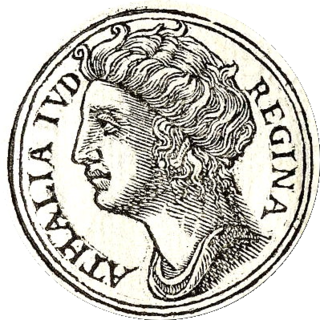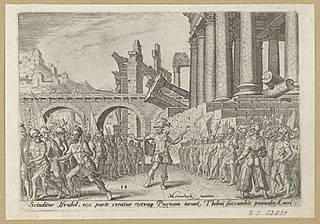The Book of Kings is a book in the Hebrew Bible, found as two books in the Old Testament of the Christian Bible. It concludes the Deuteronomistic history, a history of ancient Israel also including the books of Joshua, Judges, and Samuel.

Jehu was the tenth king of the northern Kingdom of Israel since Jeroboam I, noted for exterminating the house of Ahab. He was the son of Jehoshaphat, grandson of Nimshi, and possibly great-grandson of Omri, although the latter notion is not supported by the biblical text. His reign lasted 28 years.

Omri was, according to the Hebrew Bible, the sixth king of Israel. He was a successful military campaigner who extended the northern kingdom of Israel. Other monarchs from the House of Omri are Ahab, Ahaziah, Joram, and Athaliah. Like his predecessor, king Zimri, who ruled for only seven days, Omri is the second king mentioned in the Bible without a statement of his tribal origin. One possibility, though unproven, is that he was of the tribe of Issachar.

Baasha was, according to the Hebrew Bible, the third king of the northern Israelite Kingdom of Israel. He was the son of Ahijah of the Tribe of Issachar. Baasha's story is told in 1 Kings 15:16–16:7.

Athaliah was the daughter of King Ahab and Queen Jezebel of Israel; she was queen consort of Judah as the wife of King Jehoram, a descendant of King David, and was later queen regnant c. 841–835 BCE.

Tibni was a claimant to the throne of Israel and the son of Ginath. Albright has dated his reign to 876–871 BC, while Thiele offers the dates 885–880 BC.

Jehoram or Joram was the ninth king of the northern Kingdom of Israel according to 2 Kings 8:16 and 2 Kings 8:25–28. He was the son of King Ahab and Jezebel and brother to Ahaziah and Athaliah.

Nadab was, according to the Hebrew Bible, the second king of the northern Israelite Kingdom of Israel. He was the son and successor of Jeroboam.
The House of Gadi was a dynasty of kings of the Northern Kingdom of Israel. The dynasty is also called the House of Menahem, after its founder. The dynasty lasted for only twelve years and ruled from Israel's then-capital of Samaria. The dynasty is so named because Menahem was the son of Gadi.

The Omride dynasty, Omrides or House of Omri were the ruling dynasty of the Kingdom of Samaria founded by King Omri. The dynasty's rule ended with the murder of Zechariah of Israel by Shallum in 752 BCE, who was then killed by Menahem in the next month.

Jehu son of Hanani was a prophet mentioned in the Hebrew Bible, who was active during the 9th century BC.

Zimri, was the fifth king of Israel. His reign lasted only seven days. William F. Albright has dated his reign to 876 BCE, while E. R. Thiele offers the date 885 BCE. His story is told in 1 Kings, Chapter 16.
The House of Jeroboam or Jeroboam dynasty was a reigning dynasty of the Kingdom of Israel. They are depicted in the first of the Books of Kings. Their estimated reign is placed in the 10th century BCE.
The House of Zimri or the Zimri dynasty was a short-lived reigning dynasty of the Kingdom of Israel. It is depicted in the first of the Books of Kings, where it represents a transitional period between the reigns House of Baasha and the Omrides.
The House of Jehu or Jehu dynasty was a reigning dynasty of the Kingdom of Israel. They are depicted in both of the Books of Kings. Their estimated reign is placed from the 9th century to the 8th century BCE.

2 Kings 9 is the ninth chapter of the second part of the Books of Kings in the Hebrew Bible or the Second Book of Kings in the Old Testament of the Christian Bible. The book is a compilation of various annals recording the acts of the kings of Israel and Judah by a Deuteronomic compiler in the seventh century BCE, with a supplement added in the sixth century BCE. This chapter records Jehu's anointing as the next king of Israel and his assassinations of Jehoram of Israel, Ahaziah of Judah and Jezebel, the queen mother of Israel. The narrative is a part of a major section 2 Kings 9:1–15:12 covering the period of Jehu's dynasty.

2 Kings 14 is the fourteenth chapter of the second part of the Books of Kings in the Hebrew Bible or the Second Book of Kings in the Old Testament of the Christian Bible. The book is a compilation of various annals recording the acts of the kings of Israel and Judah by a Deuteronomic compiler in the seventh century BCE, with a supplement added in the sixth century BCE. This chapter records the events during the reigns of Amaziah the son of Joash, king of Judah, as well as of Joash, and his son, Jeroboam (II) in the kingdom of Israel. The narrative is a part of a major section 2 Kings 9:1–15:12 covering the period of Jehu's dynasty.

1 Kings 15 is the fifteenth chapter of the Books of Kings in the Hebrew Bible or the First Book of Kings in the Old Testament of the Christian Bible. The book is a compilation of various annals recording the acts of the kings of Israel and Judah by a Deuteronomic compiler in the seventh century BCE, with a supplement added in the sixth century BCE. 1 Kings 12:1-16:14 documents the consolidation of the kingdoms of northern Israel and Judah. This chapter focusses on the reigns of Abijam and Asa in the southern kingdom, as well as Nadab and Baasha in the northern kingdom.

1 Kings 16 is the sixteenth chapter of the Books of Kings in the Hebrew Bible or the First Book of Kings in the Old Testament of the Christian Bible. The book is a compilation of various annals recording the acts of the kings of Israel and Judah by a Deuteronomic compiler in the seventh century BCE, with a supplement added in the sixth century BCE. 1 Kings 12:1-16:14 documents the consolidation of the kingdoms of northern Israel and Judah. This chapter focusses on the reigns of Baasha, Elah, Zimri, Omri and Ahab in the northern kingdom during the reign of Asa in the southern kingdom.












